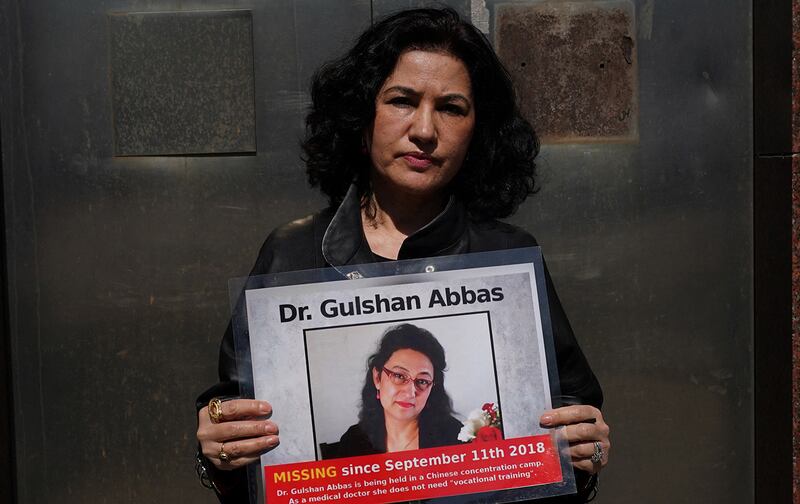Uyghur and Tibetan activists have welcomed U.S. President-elect Donald Trump’s nomination of Marco Rubio to be the next secretary of state, saying they hope the senator’s track record of defending human rights in China will continue in his role as America’s top diplomat.
The son of Cuban migrants and a longtime foreign policy “hawk” when it comes to the Chinese Communist Party, Rubio was named by Trump on Wednesday as his choice to replace Antony Blinken, who has served through President Donald Trump’s nearly four years in office.
Rubio would be the first sitting U.S. secretary of state to have been sanctioned by the Chinese government, having been blacklisted by Beijing in retaliation for U.S. sanctions on Chinese officials involved in the genocide of the Uyghurs and the crackdown in Hong Kong.
Such sanctions would bar Rubio from visiting China.
Both Uyghurs and Tibetans — large ethnic groups that live in the western regions of China — have been oppressed by the Chinese government, with the United States accusing Beijing of committing human rights abuses against both peoples.
The U.S. government and other Western parliaments have labeled China’s treatment of the 12-million strong Uyghurs a “genocide.”
Rushan Abbas, the executive chair of the Munich-based World Uyghur Congress, told Radio Free Asia the sanctions, which could complicate diplomatic ties, should be worn as a badge of honor for Rubio.

“Marco Rubio has been a steadfast advocate for human rights, particularly for the Uyghur people enduring ongoing genocide,” she said, noting his “leadership role” in Congress passing the Uyghur Human Rights Policy Act and Uyghur Forced Labor Prevention Act.
RELATED STORIES
China hawk Marco Rubio nominated for US secretary of state
Biden heads to Peru for APEC and final Xi meeting
Asian leaders congratulate Trump on US election victory
Abbas’ sister, Gulshan Abbas, has been imprisoned in China for the past six years, and she said the Florida senator had taken a personal interest in her battle to free her sister, even inviting her to Congress as one of his guests for Biden’s State of the Union address in 2020.
“His advocacy has helped in holding Chinese officials committing Uyghur genocide accountable, highlighted Uyghur prisoners of conscience, protected American markets from Uyghur forced labor and defended religious freedom,” Abbas said of Rubio’s senate tenure.
She added that she hoped Rubio “will strengthen efforts to secure justice for the Uyghur people and end the ongoing genocide.”
Experienced campaigner
Other human rights activists said Rubio could get off to a running start when it comes to U.S. relations with China, given that he already has a deep understanding of the country and its alleged rights abuses.
Elfidar Iltebir, president of the Washington-based Uyghur American Association, said she was “pleased” to learn of Rubio’s nomination and that it gave him hope “that we might finally be able to hold China accountable for its inhumane treatment of Uyghurs.”
“He is a young, fearless, and intelligent leader who already has a deep understanding of the Chinese government’s genocidal policies and state-imposed forced labor practices,” Iltebir explained.
“Having Rubio … at the State Department sends a powerful message to China: America will not tolerate oppression, and the new administration is ready to enforce a tough China policy.”
Namgyal Choedup, a representative of the Dalai Lama and the Central Tibetan Administration in North America, said that he believed it was too soon to say a State Department led by Rubio could lead to tangible change for Tibetans, but that he did not doubt Rubio’s sincerity.
“Senator Rubio’s deep understanding of Tibetan issues, his strong stance on Tibet and his significant role in sponsoring and advocating for two key Tibet-related acts passed by the U.S. government are commendable,” Choedup said. “His firm positions on China, Iran, and Venezuela have shown him to be a dedicated leader.”
In 2018, Rubio was the co-sponsor of the Reciprocal Access to Tibet Act, which seeks to deny entry into the United States to any Chinese officials who prohibit American citizens from entering Tibet.
He also pushed for the Tibet Policy and Support Act, which says any decision about Dalai Lama’s reincarnation rests solely with the Dalai Lama himself and the broader Tibetan community – and not with Beijing, which is seeking to install its own successor.
“While it is still too early to determine the exact impact he will have on Tibet, his unwavering support for the Tibetan cause is clear,” the Tibetan envoy added.
“With the new administration in place, we remain cautious, but we are optimistic, as the U.S. government, Congress, and the American people have long been strong allies of Tibet.”
Edited by Alex Willemyns and Malcolm Foster.
